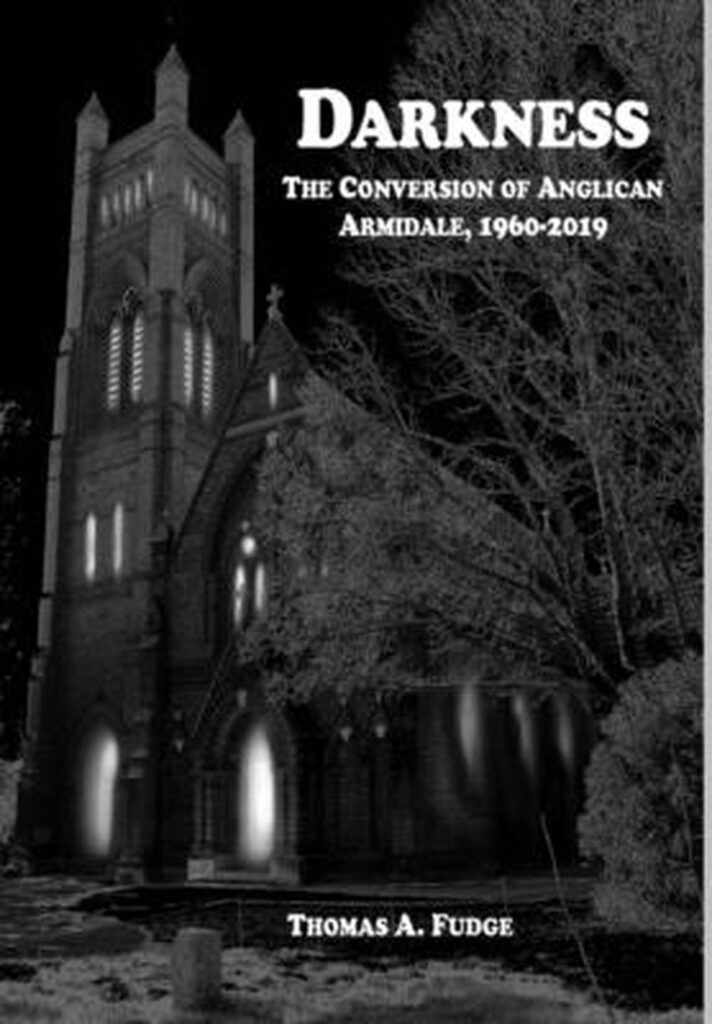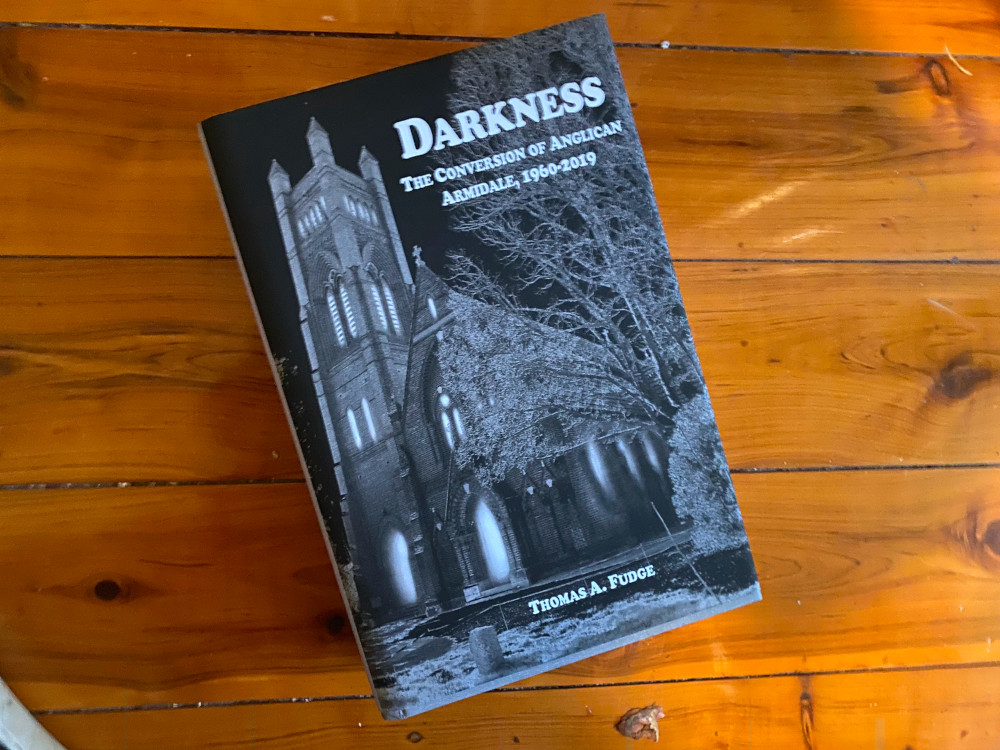A history of the regional Diocese of Armidale is an odd venue for clarifying the differences between Australia’s conservative and progressive Anglicans. But “Darkness: The Conversion of Anglican Armidale, 1960-2019” by Thomas Fudge, Professor of History at the University of New England, may well be on the way to doing just that.
As the title implies, the Fudge book takes the side of the Anglo-Catholics, who were the majority in Armidale until the Evangelical Clive Kerle was voted in as bishop in 1964, and the diocese was steered evangelical. Back then, Sydney was the lonely evangelical diocese in Australia. Since then, the pattern has changed, with the Armidale diocese shifting evangelical joined by North West Australia, Tasmania, Central Queensland, and Northern Territory shifting in the evangelical direction.
A series of responses to the book, positive and negative, makes the essential point of division clear: the doctrine of penal substitutionary atonement. This describes the central idea that Jesus died in our place to take away our sins.
• Atonement: The reparation for a wrong, in this case, to restore our relationship with god
• Substitution: Jesus died in my place.
• Penal: he bore the punishment for my sin
What is Penal Substitution (more detail)
Among evangelicals, the essay What Did the Cross Achieve?: The Logic of Penal Substitution by J. I Packer is widely admired. So let’s use that. Packer writes, “The primary issue with which penal substitution is concerned is neither the morality nor the rationality of God’s ways, but the remission of my sins; and the primary function of the concept is to correlate my knowledge of being guilty before God with my knowledge that, on the one hand, no question of my ever being judged for my sins can now arise, and, on the other hand, that the risen Christ whom I am called to accept as Lord is none other than Jesus, who secured my immunity from judgment by bearing on the cross the penalty which was my due. The effect of this correlation is not in any sense to ‘solve’ or dissipate the mystery of the work of God (it is not that sort of mystery!); the effect is simply to define that work with precision and thus to evoke faith, hope, praise and responsive love to Jesus Christ”
As Packer acknowledges, this theory of atonement is controversial: “The penal substitution model has been criticised for depicting a kind Son placating a fierce Father in order to make him love man, which he did not do before. The criticism is, however, inept, for penal substitution is a Trinitarian model, for which the motivational unity of Father and Son is axiomatic. The New Testament presents God’s gift of his Son to die as the supreme expression of his love to men. ‘God so loved the world that he gave his only-begotten Son’ (John 3:16). ‘God is love, . . . Herein is love, not that we loved God, but that he loved us, and sent his Son to be the propitiation for our sins’ (1 John 4:8–10). ‘God shows his love for us in that while we were yet sinners, Christ died for us’ (Rom 5:8).”
Fudge and the dispute over Armidale
Fudge acknowledges penal substitutionary atonement as a key teaching the evangelicals sought to make a central aspect of Armidale Anglicanism.
“Evangelicals argue that penal substitutionary atonement is the centre of Eucharistic theology in the BCP [1662 Book of Common Prayer] and considering the authority of the BCP in the Constitution this gives that perspective some force.”
But Fudge does not share this perspective. It is not entirely clear to this writer what Fudge’s view is – but it involves an Anglo-Catholic prespective that other theories of the atonement are just as valid.
He lists the atonement as one of two chief problems with the theology the evangelicals brought to Armidale. The other is what he calls “Federal Theology” the idea that in Adam’s sin came on all humankind, giving all humans a predeliction to sin. Readers should note that “Federal Theology” or “Federal Vision” is used by other writers – especially in the Presbyterian/Reformed corner of Christianity – in a very different and technical manner.
The current Bishop of Armidale, Rod Chiswell, also recognises Fudge’s critical view of Penal Substitutionary Atonement as central to the dispute.
Rod Chiswell, responding to Darkness, wrote: “I would challenge [Fudge’s] concerns [about] the central Anglican doctrine of Penal Substitutionary Atonement. The biblical doctrine affirming that Jesus Christ lived a perfect life and died a sacrificial death to pay the price for human sin so that those who put their faith in him might be forgiven and saved from God’s wrath is central to Christian faith and the Anglican understanding of it.
“Sadly, Fudge ignores the Scriptural evidence and implies that believing this doctrine and teaching it is somehow not mainstream Anglican but sectarian! The reality is that the doctrine of Penal Substitutionary Atonement is found all through the Bible and also in the current Australian Anglican formularies. Article 15 of the 39 articles states it plainly.
“Other Anglican doctrines that Fudge calls into question are: Article 17 on predestination, and Article 28 on the explicit rejection of transubstantiation. In short, the Anglicanism Thomas Fudge represents is not truly Anglican, nor even the middle church Anglican he claims the Diocese moved away from.”
But he adds, “All that said, I am grateful to Thomas Fudge for bringing to light the opinions of some, both past and present, concerning the transition that has taken place in the Armidale Diocese over the past 60 years. I have learnt a great deal and it has cast helpful light on the recent conflict experienced at St Mary’s West Armidale. This gives plenty of food for thought with regard to the way we might deal with theological difference into the future.”
Peter Carnley, the former Archbishop of Perth, who Fudge quotes in the book as an ally, affirms the centrality of Penal Substitutionary atonement in the debate in a letter to Chiswell. The Carnley letter is a response to Chiswell’s statement about Fudge’s book. “… The real cause of my alarm has to do with what you claim for the so-called penal substitutionary theory of the Atonement. You talk of Penal Substitution as a ‘central Anglican doctrine’. However, by contrast with the Incarnation and the Trinity, the Christian Church has never dogmatically defined any theory of the Atonement.
“Moreover, you seem to muddle the penal substitutionary theory and the sacrificial theory when you say Christ ‘died a sacrificial death to pay the price for human sin’ – as though the language of the Temple and the language of a law court were univocal. And though you say that Article 15 states the theory of penal substitution plainly, it has no mention whatever of penal substitution. Furthermore, the statement that ‘the doctrine of Penal Substitutionary Atonement is found all through the Bible’ is quite patently untrue.”
Readers can judge whether Carnley or Chiswell is right about whether Article 15 contains the idea of penal substitution – here it is.
“15. Of Christ Alone Without Sin
“Christ, in the truth of our nature, was made like unto us in all things, sin only except, from which he was clearly void, both in his flesh and in his spirit. He came to be the Lamb without spot, who, by sacrifice of himself once made, should take away the sins of the world; and sin (as Saint John saith) was not in him. But all we the rest, although baptized and born again in Christ, yet offend in many things; and if we say we have no sin, we deceive ourselves, and the truth is not in us.”
This writer sees the article’s description of Jesus’ sacrifice as somewhat parallel to Mark 10:15: “For even the Son of Man did not come to be served, but to serve, and to give his life as a ransom for many.”
The Armidale diocese published a second response to Darkness, a review by Mark Earngey, Head of Church History and Lecturer in Christian Thought at Moore Theological College.
“The Bible clearly teaches that our Lord Jesus Christ was punished (penal) in the place
of sinners (substitution) to propitiate the wrath of God and expiate sin so that sinners could
be at one with God (atonement).
“The Old Testament prophet Isaiah speaks about the ‘Suffering Servant’”’ in these terms. ‘The Lord has laid on him’, we are told, “the iniquities of us all.” (Isa. 53:6). And for what purpose would the Messiah be the substitute for sinners?
‘The punishment that brought us peace was on him, and by his wounds, we are healed.’ (Isa.
53:5). The New Testament authors put the same reality in different ways. For instance, the
Apostle Paul writes, ‘God made him who knew no sin to be sin for us, so that in him we might
become the righteousness of God (2 Cor. 5:21). Elsewhere, he puts it succinctly: “God
presented him as a sacrifice of atonement.’ (Rom. 3:25). This, of course, is the mind of the
other New Testament writers, such as Peter, who says, ‘Christ died for sins once for all, the
righteous for the unrighteous, to bring you to God.’ (1 Pet. 3:18). These verses illumine what
it means for Christ to be the Lamb of God who takes away the sin of the world.”
Earngey also takes Fudge to task for misrepresenting the Anglican writer Hooker’s view of scripture. Citing a famous passage from Hooker, he establishes that this key Anglican thinker regarded Scripture as above reason and tradition. “What Scripture doth plainly deliver, to that first place both of credit and obedience is due; the next whereunto is whatsoever any man can necessarily conclude by force of reason; after these the voice of the Church succeedeth.”
Carnley has also written to Earngey, and once again, he establishes the atonement and scripture as the main point of discussion. “The general purpose of your commentary seems to be to discredit Professor Fudge by trying to show that he is not authentically Anglican – both in relation to the authority of scripture and penal substitution. Unfortunately, this unwittingly demonstrates the truth of his fundamental thesis in writing Darkness – that the particular form of evangelicalism fashioned by specific commitments in relation to these two points, that was pursued with such apparent determination in the Diocese of Armidale between 1964 and 2019, was driven by the over-all motive of the exclusion of alternative points of view from Armidale diocese rather than the promotion of a welcome and inclusive diversity of opinion united in a common pursuit of truth.”
Here, Carnley points to a central division between the forces in the Anglican Church of Australia. Is the authority of scripture, as set out in Hooker and other Anglican documents such as the Book of Common Prayer, just one theory among many that we can choose from, or is it a central Anglican doctrine?
Likewise, is Penal Substitutionary Atonement something a close reading of Scripture and the Anglican documents commit us to, or one option among many?
The book Darkness and the views expressed about it give us a picture of where various Anglicanisms divide on critical doctrine.
(Correction: Fudge’s University corrected to New england)

Darkness: The Conversion of Anglican Armidale, 1960-2019. Thomas A. Fudge St Johns University Press, 2024 Available from Booktopia $69.25


At $69.95 obviously not for the average Joanne or Joe. Who is the target audience? Does John Chapman get a critical mention and what does he say about Bishop Moyes who allowed Chappo to build the church in Armidale?
University of *New England, not University of England